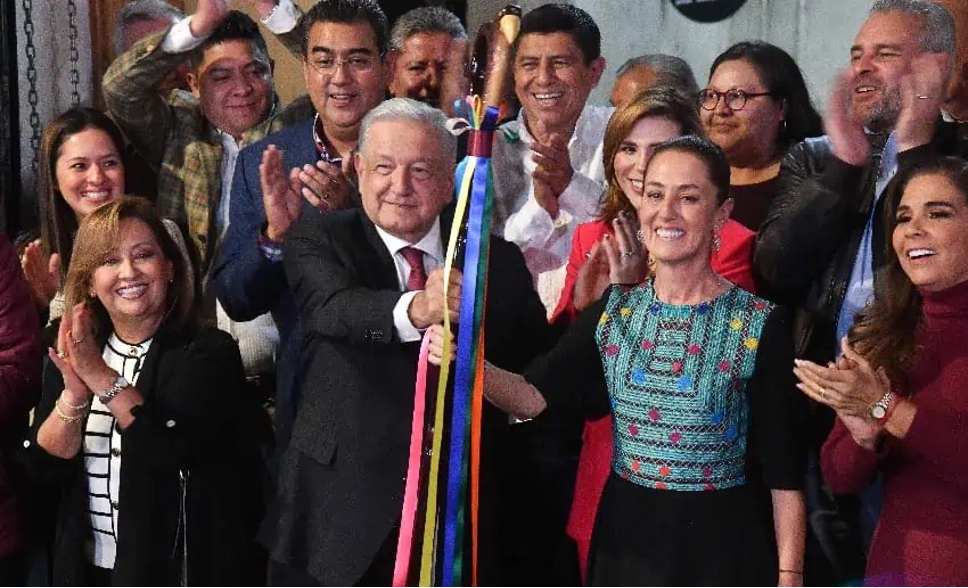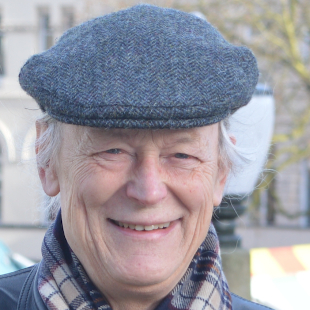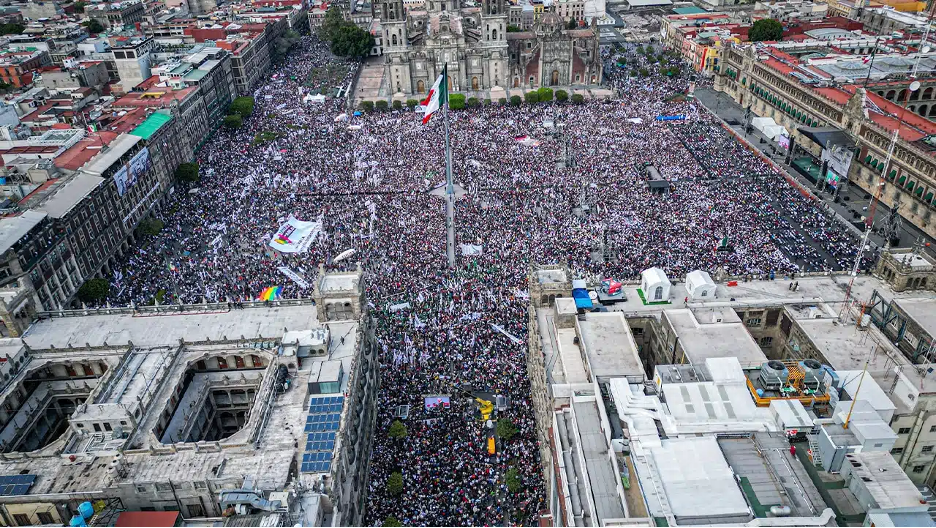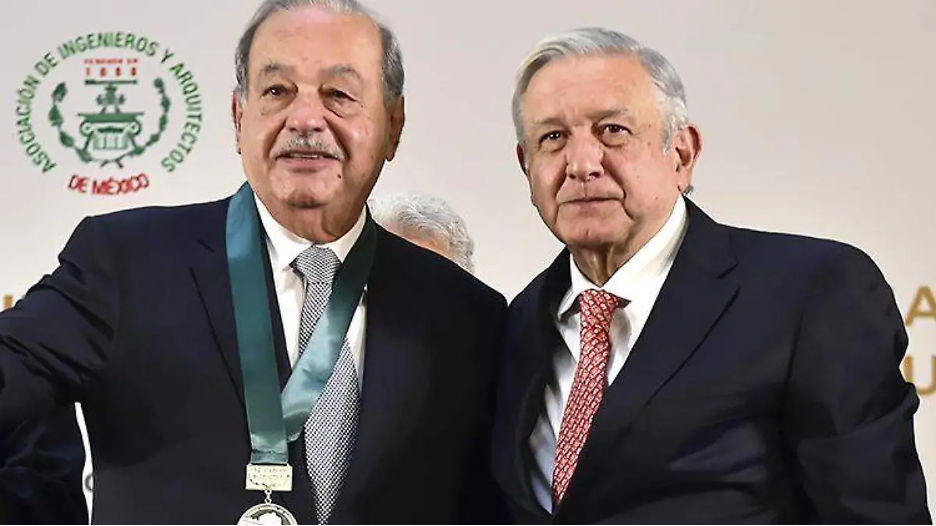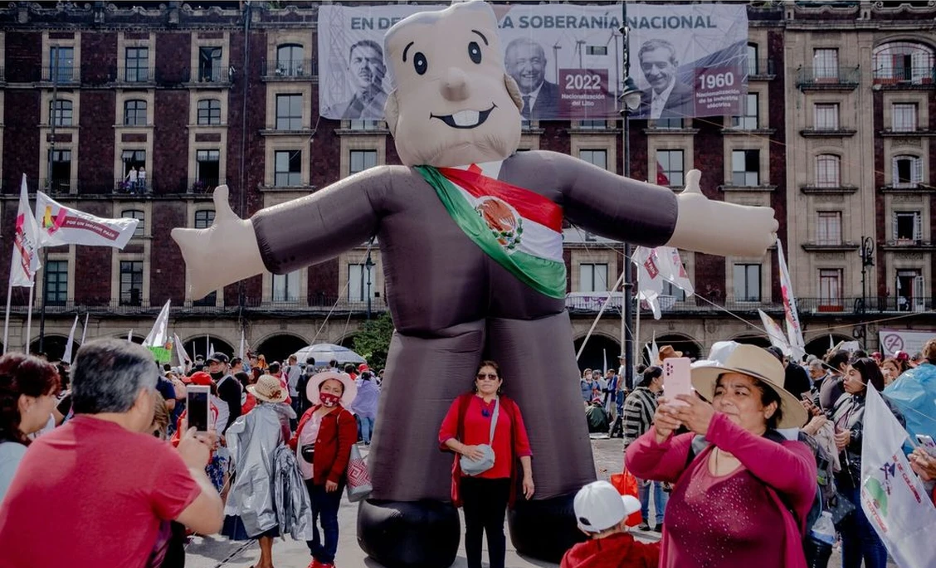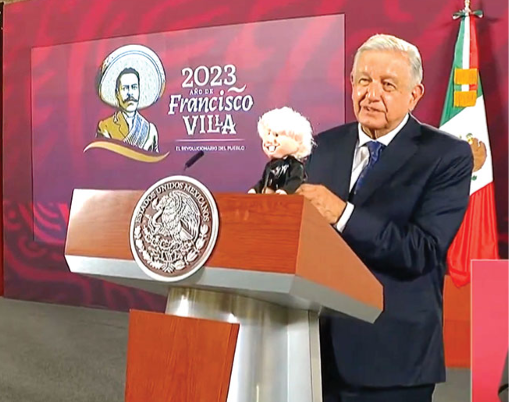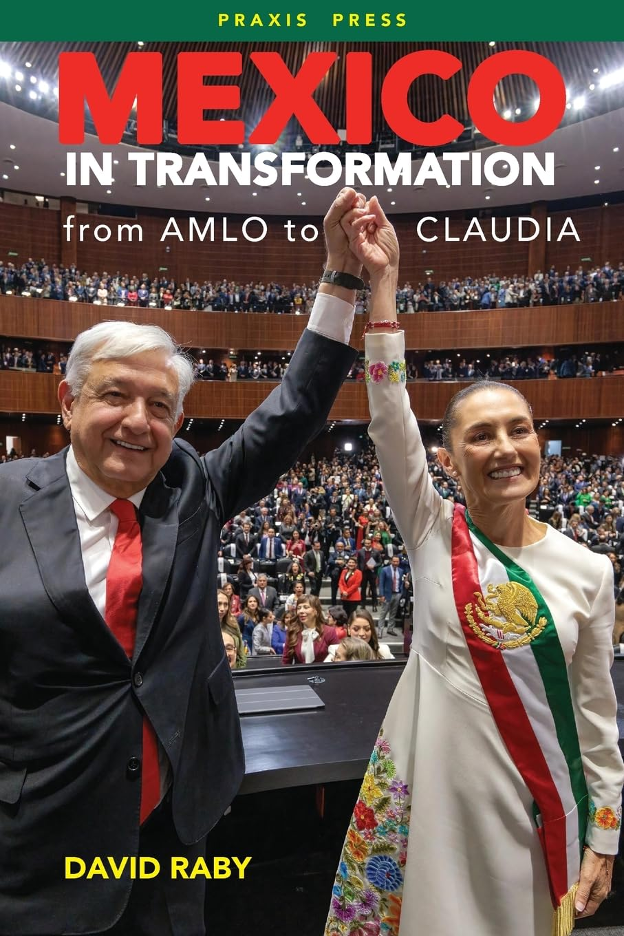|
|
The weekly newsletter of the Mexico Solidarity Project |
|
Every issue archived online at mexicosolidarityproject.org |
|
March 19, 2025 |
|
|
|
AMLO/Claudia: Continuation Not Comparison |
|
Meizhu Lui, for the editorial team |
|
|
AMLO handing over the “baton of command” to Claudia Sheinbaum. (MARIO JASSO/CUARTOSCURO.COM) |
|
“The most powerful woman in the world!” That’s what some mainstream media outlets are calling Claudia Sheinbaum. Elected with 60% of the Mexican vote, now, half a year later, she has an unprecedented 85% approval rating. She’s obviously won over a good chunk of those who voted against her. On the world stage, the leaders of nations are taking note of how calmly and skillfully she brought Trump, that vicious attack dog, to heel.
The previous president, Andrés Manuel López Obrador, while winning wide popular support, never acquired Claudia’s magnitude of backing across so many sectors of the public. Nor was he admired by the leaders of other nations — at least not in the western world — which caricatured him as an authoritarian buffoon. Does that mean that he was a lesser president than Claudia?
Hardly. Claudia is the first to say that she owes her success to AMLO. When pundits try to get her to distance herself from him, she’ll have none of it. She states unequivocally and proudly that she fully supports his 4th transformation (4T) project and its ideological and political foundation. She is erecting the “second floor.”
Author, historian and socialist activist David Raby has been and is a keen observer of Mexican politics. His latest book, hot off the press, is Mexico in Transformation - from AMLO to Claudia: A 'new Mexican revolution' in the time of Trump. While some on the socialist left dismiss AMLO’s accomplishments because he never renounced capitalism, David gives us a clear-eyed view of what AMLO was able to accomplish — from a socialist point of view.
Since leaving the presidency, AMLO has done as promised; he retired to his country home and left Claudia to govern without meddling. He doesn’t need to meddle; his 4T lives not just in Claudia’s policies but in the hearts of the Mexican people. |
|
For a deeper dive into current news and analysis in English, check out our media website. And definitely see the new English podcast ¡Soberanía! (Sovereignty) with José Luis Granados Ceja and Kurt Hackbarth. |
|
Sin Muros is a weekly program dedicated to analyzing the Mexico-US relationship. An experienced team of journalists reports news, analysis and research from both sides of the border. Their cultural segments and interviews help to build understanding between Mexico and its migrant community. (English + Spanish) |
|
|
Don’t miss an issue! Sign up for a free Mexico Solidarity Bulletin subscription. |
|
|
A Socialist View of Mexico’s 4th Transformation |
|
|
Author and journalist David Raby is a Professor Emeritus in History at the University of Toronto, specializing in Latin American and Iberian affairs. He has published extensively on the modern history and politics of these areas and has also been actively involved in solidarity movements with Cuba, Chile, Venezuela, Colombia and Central America in both the UK and Canada. Mexico in Transformation, from AMLO to Claudia has just been released. You can order it at a discount, with this code: 25FOR25 |
|
You’re a socialist, and AMLO is not. Does his vision of a good and fair society match yours?
AMLO’s philosophy of “Mexican humanism” calls for a system that lifts up the poor and the working class, as we socialists desire. Mexico’s history is different from Europe’s, and he roots his vision in the Indigenous belief systems that existed before the Spanish conquest. I would call revolutionary any project that seeks to challenge private profit as the primary mover of the economy and society.
In his six years, he ended the dominance of private enterprise, but not only because its aim is to make money rather than to improve lives; private enterprise fragments the production and distribution of goods and services. It prevents the government planning required to meet the needs of every member of society. |
|
His 4th transformation (4T) project renationalized many sectors — most importantly the energy sector, because everyone needs electricity, gas and oil. |
|
|
The Zócalo in Mexico City, celebrating AMLO’s re-nationalization of the oil industry on March 18, 2023. Photo: Plumas Atómicas |
|
His administration could then set prices and protect the public from the market fluctuations that can devastate a poor person’s budget. Many new enterprises — the railroad, the airport, an oil refinery, an airline — were public projects. For AMLO, serving the public interest was primary.
But did he do enough to challenge capitalism — for example, by raising tax rates on the rich, as some socialists urged him to do?
You cannot turn an entire economy around in six years. AMLO needed private capital to invest in his public projects. As an astute political strategist, AMLO sought to win over the private sector, not drive them away. He could not afford a strike by capitalists, in which they’d take their money out of Mexico. He avoided that danger by not raising taxes.
However, he told the wealthy and the corporations that you must pay the taxes that you owe. Walmart owed 350 million dollars that previous administrations never collected; under AMLO they paid. Effective tax collection was how he funded the new programs that put cash directly in the hands of the elderly, students and the disabled.
AMLO’s institution of “republican austerity” challenged capitalist thinking — it meant putting the rich and the government on a diet. No more expense account padding or unnecessary private middlemen — often relatives of government officials — between government and people.
When he took office, he immediately slashed his own salary by 60% — who does that! — and passed a law that no government worker’s pay could exceed the President’s. This resulted in the battle with the judiciary and the Electoral Commission that was so much in the news. They didn’t want to lose their lavish lifestyles at public expense, but they couldn’t say that. Instead, they accused him of being autocratic.
In 2018, Mexico had the lowest minimum wage in Latin America. However, when AMLO doubled that, the big foreign companies didn’t resist. They increased worker pay as required, because using cheap Mexican labor rather than US or European labor already gave them profit margins through the roof. And when the people had more money, they had more purchasing power, which helped grow the economy, and that was good for business overall. |
|
Every society has a few rich people who support greater equality. In Mexico, their richest man, Telmex magnate Carlos Slim, supported AMLO’s reforms. It was vitally important to have such a prominent member of the bourgeoisie on his side. |
|
|
Carlos Slim and AMLO Photo: Cuartoscuro |
|
Another extremely wealthy person, Altagracia Gómez Sierra, publicly supported Claudia Sheinbaum during the 2024 campaign, saying that she “wanted to end poverty.” Of course, most of the wealthy are diehards, like Ricardo Salinas Pliego of TV Azteca. He still refuses to pay taxes and leads the conservative opposition.
In 2018, AMLO failed to win the votes of many in the working class. Did he “buy their support” with his welfare programs, as his critics accused him? |
|
|
Photo: Fred Ramos /Bloomberg |
|
If you are better off because your president has prioritized your well-being, why wouldn’t you support them? But AMLO’s goal was not to gain their support for him personally; he wanted workers to understand what the 4T was about and to support its continuation. |
|
He addressed the question of who would succeed him with his political skill. He didn’t stand for re-election — proving that he wasn’t a “dictator,” as accused in the Western press. Nor did he handpick a successor — proving that he was not a puppet master pulling the strings from behind the curtain, as also accused. Instead, his stepping away obliged Morena to become more organized at the level of the base, turning the base into a conscious mass movement. |
|
That consciousness was developed through the mañaneras, morning talks with the people, a democratic innovation begun by AMLO and continued by Sheinbaum. These are opportunities to teach people what neoliberalism is and why it should be opposed. The masses, who loved the mañaneras as much as soap operas, learned the principle of building the nation by lifting from the bottom, rather than giving to the rich and expecting rewards to “trickle down” to the poor. |
|
|
López Obrador’s daily mañaneras were an effective form of political education and theater. |
|
We see the rise of the extreme right in many countries — but not in Mexico. Why? Because Morena’s political education has been effective. The people experienced personally how AMLO’s policies resolved their economic worries and frustrations. These same kinds of insecurities lead people in the US and other countries to turn toward the right politically. They listen to conservatives arguing that what plagues the economy is big government, and thus government functions should be privatized. But in Mexico, the people have learned that expanding the public sector is the solution; they’ve turned decisively to the left.
So, we see how AMLO used education, not repression, to defeat the right. His most virulent critics were free to speak without censorship; they were free to demonstrate and weren’t stopped or arrested, even when they bashed down the doors of the Presidential Palace. AMLO said that he himself had demonstrated against previous governments and that others had a right to demonstrate against him! The people who had experienced brutal repression when they stood up for their rights are not blind to what real democracy looks like. |
|
Socialists don’t believe in the “great man” theory of history. Was AMLO a “great man”?
In capitalist countries, where individualism is worshiped, the people may see a nation’s president as a “great man.” AMLO began the process of a great national transformation and laid the groundwork for its continuation; leaders like AMLO come to be seen as great when they implement policies that meet the people’s needs and work with the people. He knew where the real power lies.
Another transformational leader, Mao Tse-Tung, once said, “It is the masses who make history.” AMLO’s own mantra (quoting from the 19th-century Indigenous president Benito Juárez) was “With the people everything, without the people, nothing.” |
|
|
Mexico in Transformation, from AMLO to Claudia by David Raby |
|
|
|
|
The Fight for Language Justice in the US |
|
|
Bill Gallegos, a veteran Chicano liberation activist, environmental justice leader, and revolutionary socialist, has a lot to howl about. Many also know Bill for his poetry and political essays. Gallegos is a member of the editorial board of The Nation. |
|
|
On March 1, US President Donald Trump issued an executive order declaring English as the official language of the United States. His goal — to penalize the country’s millions of non-English speaking peoples, most of whom are Spanish-speaking, with the great majority being Chicanos and Mexicanos. More than 41 million people (13% of the population) speak Spanish as their FIRST language, not to speak of the millions more who speak both Spanish and English. Altogether, more than 69 million US residents speak a non-English language. These include 169 Indigenous languages that survived genocide and dispossession by the white settlers who colonized the United States.
The Indigenous peoples and Mexicans living in Mexico’s northern territories didn’t abandon their own languages for English because they loved the sound of Shakespeare’s sonnets. The white settlers prevailed with the rope and the gun and the law. With the help of schools and the government, they imposed English on the non-English speaking, and so-called standard English became the dominant language in the US. This language oppression made it much easier to steal their lands, exploit their labor and impose second-class citizenship.
Trump and the racist right wing want to make English the official US language so they can attack bilingual and multilingual education programs. They will stop the use of non-English ballots in US elections and eliminate translation and interpretation services in US courts and government offices, as well as in hospitals and social service programs.
US racists have been trying for decades to make English our official language, focusing on changing local and state laws. But you know what? Today, the US has more non-English speakers than ever. We’ve beaten back this racist attack before and will do so again. It makes me so proud as a Chicano that our people will be at the forefront of this crucial struggle for our language rights and for democracy.
Sí, se puede! |
|
|
|
|
Recent news reports and commentaries, from progressive and mainstream media, |
|
Tim Young, Mexico Resists Trump and Continues to Advance Labour Outlook. Government functions previously outsourced to private and semi-private firms have been brought back in-house and the subcontracting of public services abolished.
Sheinbaum: “Es tiempo de mujeres y el país late con corazón de mujer” Telesur. La presidenta de la nación mexicana anunció 10 acciones clave para garantizar el reconocimiento de las mujeres en la sociedad mexicana.
Nathan J. Robinson, Mexico Shows How Social Democratic Politics Can Win and Be Popular Current Affairs. Sadly, the US left is (happily or unhappily) stuck in the DNC, and unable when examining Mexican politics to see that the lessons Morena holds are more about a long-term project of the left to build its own political party, than what elements the Democrats could mimic to return that party of genocide to the White House.
Alma E. Muñoz y Alonso Urrutia, Jalisco debe informar sobre lo hallado en rancho de Teuchitlán: Sheinbaum La Jornada. La presidenta Claudia Sheinbaum Pardo demandó al gobierno de Jalisco que informe todo lo que se encontró en el rancho Izaguirre, en Teuchitlan, Jalisco -presuntamente utilizado como narcocampamento por el CJNG-, al resaltar que la fiscalía estatal hizo un resguardo original del inmueble en septiembre de 2024, y hasta ahora sólo se tiene la información de los grupos de buscadores.
Fifís vs Chairos — the Latest in Identity Politics Mexperience. Mexico’s latest linguistic fashion in "them" versus "us" is fifís vs chairos; neither word is new, but they have been popularized by contemporary politics
Montserrat Antúnez, Nos inundan de plástico Sin Embargo. Estados Unidos envía a México basura plástica que contamina sin pagar nada o dejar algún beneficio al país, alertan organizaciones civiles.
Workers at Pirelli Mexico make call for fair union elections Industriall. Some 1,000 members of the Independent Mexican Workers’ League (La Liga) are demanding fair union elections in a bid to negotiate the collective bargaining agreement at Pirelli Tyres.
María del Pilar Martínez, Se adelantan a la reforma e incluyen disminución de jornada laboral en contratos colectivos El Economista. Ante la inminente discusión y aprobación de la reforma laboral relacionada con la reducción de la jornada laboral de 48 a 40 horas, los sindicatos y empresas se adelantan y empiezan a negociar y aplicar en sus contratos colectivos de trabajo dicha disminución.
Pablo Meriguet, Trump suspends 25% tariff on Mexican imports after talk with Sheinbaum People’s Dispatch. Sheinbaum and Trump agreed to suspend the “tariff war” until April 2 when the commercial situation will be evaluated. The 25% tariff against Canada was also suspended.
Yael Sebastián Díaz Santos, El cine y el poder en nuestro país Gooya. La relación entre cine y política en México forma parte de un fenómeno más amplio que involucra el uso del cine como medio de propaganda y herramienta para la construcción de narrativas históricas oficiales. Sin embargo, la interacción entre cine y política no funcionó tan armoniosamente, ya que algunas producciones desafiaron o complicaron las narrativas oficiales, generando tensiones entre los directores y el Estado. |
|
|
|
|
The Mexico Solidarity Project brings together activists from various socialist and left organizations and individuals committed to worker and global justice. We see the 2018 election of Andrés Manuel López Obrador as president of Mexico as a watershed moment. AMLO and his progressive Morena party aim to end generations of corruption, impoverishment, and subservience to US interests. Our Project supports not just Morena, but all Mexicans struggling for basic rights, and opposes US efforts to undermine organizing and Mexico’s national sovereignty.
Editorial committee: Meizhu Lui, Bruce Hobson, Agatha Hinman, Victoria Hamlin, Courtney Childs, Pedro Gellert. To give feedback or get involved yourself, please email us! |
|
Subscribe! Get the Mexico Solidarity Bulletin in your email box every week. |
|
Web page and application support for the Mexico Solidarity Project from NOVA Web Development, a democratically run, worker-owned and operated cooperative focused on developing free software tools for progressive organizations. |

